Don’t Just Leave It There: Addressing Lead in Redevelopment
Session Summary
The Flint water crisis in Michigan, which peaked in media coverage between 2015 and 2016, sounded the alarm on our nation’s aging infrastructure and the resulting detriment to public health. Over the past year, it has become clear that New Jersey is also battling the critical issue of lead in water, along with paint and soil. As older municipalities strive to attract new economic development and residents, lead contamination may pose a major obstacle.
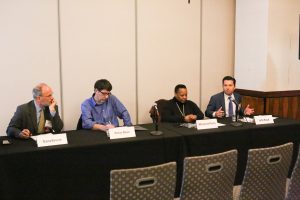
Don’t Just Leave It There: Addressing Lead In Redevelopment panel: Gary Brune, Peter Rose, Marjorie Perry, and John Boyd
The Don’t Just Leave it There: Addressing Lead in Redevelopment session, part of the 2020 Redevelopment Forum, focused on lead issues related to disclosure, transparency, business recruitment, and redevelopment of residential and commercial property. Gary Brune, Policy Manager at New Jersey Future, moderated a discussion among panelists: Peter Rose, Managing Director of Community Enterprises at Isles; Marjorie Perry, President and CEO at MZM Construction and Management; and John Boyd, Principal at The Boyd Company. The discussion was guided by a central question: “To what extent is lead contamination an obstacle to redevelopment in New Jersey and what does the future hold?”
In New Jersey, disclosure is mandatory for building defects, but voluntary for environmental hazards such as lead. That is a primary factor in why the state earned a D grade in a 2017 report by EDF rating all 50 states on their lead disclosure policies. When it comes to disclosure, there is a fundamental conflict between personal safety and real estate value. On one hand, the first step to remediating lead contamination is determining where it is, but greater transparency could lead to decreased property values and reduced investment and/or redevelopment. There was general agreement among the panelists that disclosure is a necessary measure. According to Rose, “It’s good public policy. It’s good health policy. It’s actually good economics for everyone.” He also argued that in most places where property owners assumed disclosure would have a terrible effect, it actually improved the situation and most landlords are content.
Boyd provided the perspective of site selection in the development community and how lead contamination is an obstacle for new development and new job creation. He claimed that, more often than not, if a developer is deciding between a site with lead and one without, the site with lead will be eliminated from the process. Additionally, Boyd noted that clients will be wary about the broader potential impact on property taxes and water utility rates as communities establish financial plans to deal with the problem.
Boyd further emphasized that lead contamination is both a health crisis and an economic development crisis, describing it as “a battle that needs to be fought on both fronts.” Noting that disasters like the lead crisis can serve as a pivot point for development and redevelopment, Boyd highlighted the examples of Flint’s Capitol Theatre restoration, which served as a lynchpin for broader downtown redevelopment, and how New Orleans and Baton Rouge positioned themselves to be national leaders in the water management market after the devastation of Hurricane Katrina. He thinks that Newark, with its proximity to New York City and a strong financial industry presence in the region, has a similar opportunity to become a leader in environmental infrastructure.
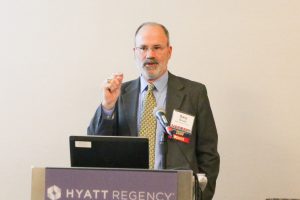
Gary Brune, Policy Manager, New Jersey Future.
Brune asked the panelists if the presence of lead contamination affects redevelopment in all cities similarly or if some are more constrained than others. He referred specifically to the differences between cities that are close to New York City, like Newark and Jersey City, and cities that aren’t, like Trenton. Perry explained that cities like Hoboken, for example, are able to address the lead problem more effectively because they strike a balance between offering tax credit incentives to attract development and utilizing tax income to pay for lead solutions. She emphasized that cities offering tax credits over longer periods of time (e.g., 30 years, rather than 10) miss out on money that could be put towards remediation.
It is clear that lead poses multiple challenges to redevelopment in New Jersey, but there are solutions at hand. For one, improving disclosure and transparency is an important step towards resolving the issue. Regarding business retention, Newark and other cities may be in a position to take advantage of the opportunity to become a leader in solving the lead crisis while spurring development and redevelopment. Overall, redevelopment for both commercial and residential properties will require strong public policy. As Perry noted, it is important to strike a balance between offering tax credits and utilizing tax funds. Newark may be a model to look to, with its property access law, methodical replacement of lead service lines, and presence of robust financial and technology industries. However, areas like Trenton that are not located near robust economic centers like New York City, will need more assistance.
For more information on lead in drinking water in New Jersey, please refer to Jersey Water Works’ Lead in Drinking Water Task Force Report, published in October 2019.
This summary was written by Kimberley Irby from New Jersey Future.
Building a Healthier New Jersey
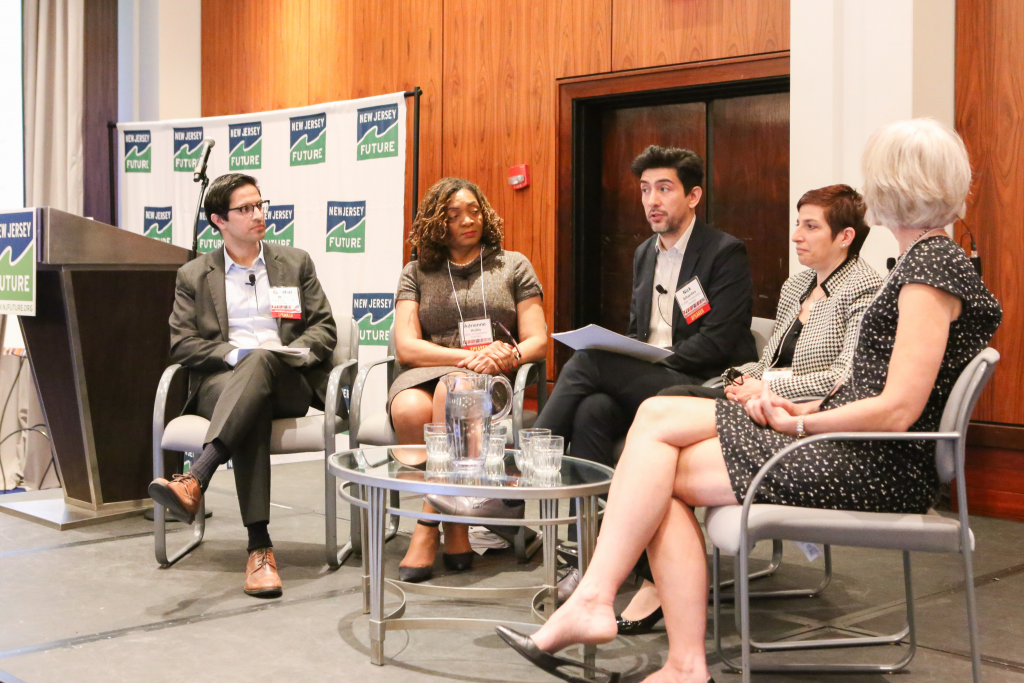
New Jersey Future’s Redevelopment Forum 2020 included a thought-provoking morning plenary titled Building Healthy Communities that focused on creating healthier, more equitable communities utilizing a culture of health approach in planning and redevelopment. The plenary’s panel of experts included moderator Giridhar Mallya, Senior Policy Officer for the Robert Wood Johnson Foundation, Staci Berger, President and CEO of the Housing and Community Development Network of New Jersey, Adrienne Hollis, PHD, JD, Senior Climate Justice and Health Scientist for the Union of Concerned Scientists, Nick Sifuentes, Executive Director of the Tri-State Transportation Campaign, and Chris Sturm, Managing Director of Policy and Water at New Jersey Future. The panelists collectively discussed ways in which the built environment seriously impacts the health of the people within it, with specific focus on climate change, equity, transportation, housing, and lead.
Climate Change
Adrienne Hollis opened the plenary with a riveting presentation on climate change and its inequitable impacts on the health of communities. Comparing climate change to an epidemic requiring a global response much like the current COVID-19 pandemic, Hollis noted that the effects of climate change and related adverse health effects are experienced “first and worst” in environmental justice communities. Hollis explained that race is the most significant predictor of a person living near contaminated air, water, and soil, and that climate change compounds the existing health problems of environmental racism. Hollis also spoke about present-day concerns of climate gentrification as a result of climate change and the “food apartheid” occuring as some families are forced to choose between eating and keeping their children cool. Urging everyone to act now, Hollis said “climate change is a public health emergency. There is no doubt… We have to be responsive to it. And by being responsive, I don’t mean just adaptation and mitigation, I mean making sure our communities can go from surviving to thriving and being resilient.”
Equity
Giridhar Mallya continued the discussion on the link between health and equity with an informative overview of the recent report Building a Culture of Health: A Policy Roadmap to Help All New Jerseyans Live Their Healthiest Lives by the Robert Wood Johnson Foundation and Rutgers University. Mallya defined health equity as everyone having a fair and just opportunity to be as healthy as possible, noting “this requires removing obstacles to heath such as poverty, discrimination, and their consequences, including powerlessness and lack of access to good jobs with fair pay, quality education and housing, safe environments, and health care.” Following the presentations by Hollis and Mallya, the panel participated in a moderated discussion on the most pressing health issues related to planning and redevelopment, again with a focus on equity.
Transportation
Nick Sifuentes emphasized the inextricable link between transportation, poverty, and health, and therefore the critical need for transportation planning to take equity into consideration. In poor communities that lack access to good reliable transportation, Sifuentes described how “your entire world shrinks” as access is lost to jobs, health care, and education that could uplift someone out of poverty. Sifuentes said there is opportunity for real change in transportation planning and revitalization as new policies are developed to address the current transportation system crisis and the fact that the transportation sector is a key driver of climate change.
Housing
Staci Berger stressed the need for affordable housing development with access to transit, and described how Superstorm Sandy demonstrated the strong connection between climate change, the built environment, and health. Berger described how, following Sandy, displaced homeowners experienced a wide range of health problems in large part due to New Jersey’s lack of affordable housing. Berger also spoke about the connection between home ownership, rental opportunities, health equity, and race. Berger explained that in New Jersey’s expensive rental market, a person would have to work three full-time jobs to afford an apartment. With so many families working just to pay rent, paying for medical care often is not an option. Berger noted that when someone is evicted in the state, it is very difficult to find another safe affordable rental and that “eviction rates in New Jersey are a public health crisis” as so many sick workers must go to work to avoid eviction.
Lead in Drinking Water
New Jersey Future’s Chris Sturm highlighted removing lead from New Jersey drinking water as the most pressing and urgent water infrastructure issue, given that lead exposure causes permanent damage to children’s developing brains and is present in private homes. Sturm detailed the inequities of the lead problem, noting that “the people it impacts have the least power to affect change” and that children born into low-income families and children of color are much more likely to experience lead poisoning. Sturm also discussed the groundbreaking plan to remove lead in New Jersey drinking water within the next ten years. The plan stems from the work of the Jersey Water Works Lead in Drinking Water Task Force and its consensus report released last October, which recommended solutions New Jersey is now starting to implement.
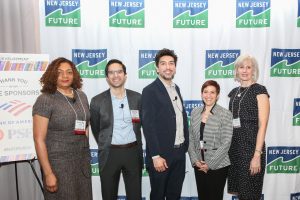 Given the many present-day health concerns impacting the built environment of our communities, New Jersey Future is dedicated to incorporating a culture of health into all of our work. From removing lead service lines, to making our coastal communities more resilient, to helping towns plan for healthy walkable downtowns, we are helping New Jersey grow smarter and healthier. We hope you will join us.
Given the many present-day health concerns impacting the built environment of our communities, New Jersey Future is dedicated to incorporating a culture of health into all of our work. From removing lead service lines, to making our coastal communities more resilient, to helping towns plan for healthy walkable downtowns, we are helping New Jersey grow smarter and healthier. We hope you will join us.
This summary was written by Kelley Heck from Heck Public Affairs.
Forum 2020 Keynote – Climate Change and Inequity: Today’s Great Threats and the Role of Redevelopment
Smart Growth Expert Names Climate Change, Inequity as Critical Threats
Former Governor of Maryland and current President of Smart Growth America’s Leadership Institute Parris Glendening delivered a powerful keynote address at New Jersey Future’s Redevelopment Forum 2020 on March 6, warning attendees that climate change and inequity are significant threats to the planet and are critically linked to the future of land use in New Jersey and everywhere.
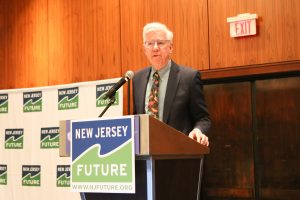
Governor Glendening at the 2020 Redevelopment Forum.
Glendening opened his remarks in New Brunswick to the crowd of more than 500 developers, planners, engineers, state and local officials, and land use advocates with a story about his days as a college student traveling between school in Tallahassee and his home in south Florida. Not considering himself an environmentalist at the time, Glendening spoke about watching the Everglades change before his eyes as they were developed 70 miles out from their once-protected edge. It was an “aha” moment for the governor as he realized that “something was clearly wrong. That was our water supply. That’s where we absorbed the storm surges.”
Years later, as a local official in Maryland, Glendening grew more and more concerned about sprawl and the need to preserve open space. He recognized the crucial importance of revitalization and investing in existing infrastructure, and ran for governor to protect the Chesapeake Bay and its precious ecosystem. Glendening was elected and served as Governor of Maryland from 1995-2003. While in office, he created the nation’s first state-level smart growth policy package, for which the governor received Harvard University’s Innovations in American Government Award.
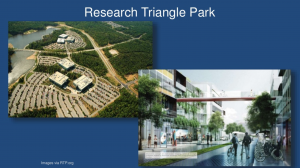
Triangle Park, North Carolina.
In his remarks, Glendening highlighted recent demographic trends indicating a shift away from sprawl as people today want more walkable and bikeable communities for living, recreating, and working. To illustrate the change, the governor used the example of the plan to transform Research Triangle Park in North Carolina from a sprawling suburban office complex to an urban, walkable, mixed-use district offering greenspaces, offices, residences, retail, and a light rail line.
Despite the benefits of an exciting shift toward redevelopment and land preservation, Glendening warned about the harsh reality of redevelopment’s inequitable effects, providing examples of entire communities being displaced and people’s lives made worse as a result of revitalization. Emphasizing that relocating people costs them valuable money, time, and jobs, Glendening urged forum attendees to ask “does this policy reduce or expand inequality” when considering land use alternatives. The governor spoke about America’s rapidly disappearing middle class and noted that our “cities and towns are in danger of becoming home to only the very wealthy and the very poor,” citing the cost of housing as a major contributor to present-day inequities in areas like health and education.
Glendening also spoke about climate change as a second powerful force threatening redevelopment and the future of land use, noting that it has created a “constant need for mitigation and resilience.” The governor talked about sunny day flooding occurring regularly in his hometown of Annapolis and the many millions of people who will need to be relocated over the next decade due to flooding from climate change, including 18 million people in Bangladesh, India alone. On the hopeful side, Glendening stressed that we can address many current climate change problems through improving land use practices, like the greening of stormwater management, complete and green streets, walkable communities, and better transit systems.
As an organization fully committed to combating both inequity and the impacts of climate change as they relate to redevelopment, it was an honor to have Governor Glendening list so much of New Jersey Future’s current work as the smart solutions to combating these two major threats to our communities. From co-chairing the regional Waterfront Alliance Coastal Resilience Task Force, to our work on stormwater and green infrastructure, to promoting aging-friendly communities with affordable housing, to combating lead in drinking water, New Jersey Future has made it a priority to incorporate equity and resilience into everything we do. The time to confront future threats to redevelopment is today. We agree with Governor Glendening that “climate change and inequity are pulling our country apart, and they are guaranteed to get worse if we continue on the same path,” which is why we continue working for a more inclusive and more resilient New Jersey.
This summary was written by Kelley Heck of Heck Public Affairs.
Smart Growth Gets Smarter
Redevelopment Forum 2020 Highlights: Equity, Health, Resilience
“Places are more than a town or a city. Places surge lifelong through our bloodstreams. Places are a great unifier. Places help shape our dreams and desires. Places give us so much more of what is required to breathe free and live, live ever higher. Place is so much more than an ‘X’ on a map.” –Pandora Scooter, spoken word artist and Redevelopment Forum performer.
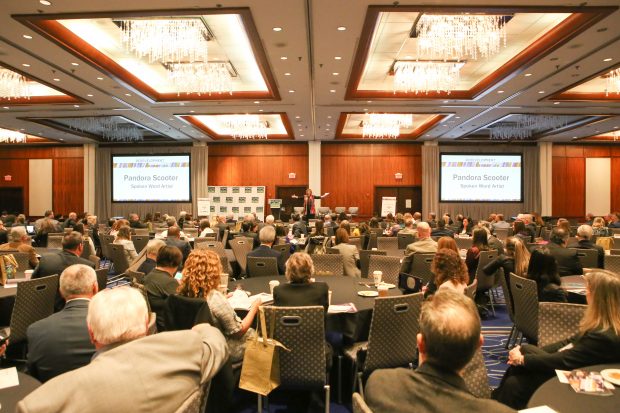
How can we plan smarter and more equitably? These were the important questions considered at New Jersey Future’s 15th annual redevelopment forum. More than 500 planners, developers, local and state officials, and other professionals joined New Jersey Future in New Brunswick at the March 6 day-long conference to look at current redevelopment trends and hear from thought leaders in the field. In his welcome, New Jersey Future Board of Trustees Chair President Peter Reinhart spoke about the evolution of smart growth. Today, all aspects of a redevelopment project and its impact on the community must be considered, with special focus on health, resiliency, and equity. Reinhart urged forum attendees to “keep the big picture of redevelopment in mind and ask yourself how you can play a role in ensuring New Jersey’s redevelopment is the smartest and most inclusive it can be.”
Health
The morning plenary, Building Healthy Communities, featured panelists from various planning-related fields who examined ways in which the built environment impacts the health of the people within it. Moderator Giridhar Mallya, Senior Policy Officer for the Robert Wood Johnson Foundation, led the panelists in a discussion on how transportation, lack of affordable housing, lead in water, and climate change are impacting health, demonstrating the critical importance of incorporating a culture of health approach into redevelopment planning and implementation.
 Resilience
Resilience
Climate scientist Dr. Adrienne Hollis of the Union of Concerned Scientists noted that climate change is a public health emergency with serious impacts experienced in environmental justice communities “first and worst.” New Jersey Future’s Managing Director for Policy and Water, Chris Sturm, discussed a plan to remove lead in New Jersey drinking water over the next decade, stemming from the work of the Jersey Water Works Lead in Drinking Water Task Force. This work was also discussed in a lead-focused morning breakout session moderated by New Jersey Future’s Policy Manager Gary Brune. Nick Sifuentes, Executive Director of Tri-State Transportation Campaign, and Staci Berger, President and CEO of the Housing and Community Development Network of New Jersey, shared the importance of access to transit and safe, affordable housing to the health of individuals and communities.
New Jersey Department of Environmental Protection Commissioner Catherine McCabe spoke to forum attendees about the threat of rising sea levels and the steps New Jersey is taking under Governor Murphy’s administration to combat and adapt to climate change, including the signing of two executive orders, emphasizing “if you know what to plan for, you can adapt to it.” Mentioning the effects of sea level rise in his own hometown of Annapolis, President of Smart Growth America’s Leadership Institute and former governor of Maryland, Parris Glendening spoke in his keynote address about climate change and inequity as two of the greatest threats to our future, warning that “we will face both economic and humanitarian crises if we do not start to address (these issues) in a more focused and in a more effective way.” One afternoon breakout session looked at ways in which communities can make transportation, energy, and water systems resilient, and at redesigning these systems to take advantage of new technologies and changing community needs, much like the Gateway Master Plan in the Tampa Bay area.
Equity
Using redevelopment to achieve more equitable communities was a prominent theme throughout this year’s forum. Equity was a significant feature of the plenary discussion on climate change, infrastructure investment, and affordable housing, and it was in Governor Glendening’s urging of everyone to consider whether each policy reduces or expands inequality, to ensure that people’s lives are not made worse by redevelopment decisions. Equity was the focus of a breakout session on redevelopment strategies to achieve equity, and it was a large part of a session on place-based economic development in downtowns. New Jersey Future Executive Director Peter Kasabach highlighted equity in his remarks, receiving a round of applause in acknowledging “we need to break down segregation in this state and recognize diversity is one of New Jersey’s greatest strengths and one of our most important assets.”
New Jersey Future has made it a priority to incorporate this year’s forum’s core concepts into all of its work. From combatting lead in drinking water, to promoting aging-friendly communities, to working on the State Plan, New Jersey Future aims to create healthy, equitable, and resilient communities where people want to live and work. We hope you will join us. Let’s grow smarter together, New Jersey.
This summary was written by Kelley Heck from Heck Public Affairs.
Explore sponsorship opportunities
New Jersey Future’s Redevelopment Forum is a day-long conference that brings together more than 500 municipal and state leaders; community activists; and leading professionals in planning, development, law, transportation, architecture, construction, environmental conservation, and historic preservation to share best practices and lessons learned.
Sponsorships are available at various levels.
Register now!
The 2020 Redevelopment Forum is on Friday, March 6 at the Hyatt Regency in New Brunswick.
New Jersey Future’s annual Redevelopment Forum is our biggest event of the year, attracting more than 500 attendees. Join us to share innovative ideas, learn best practices, network, and make our state a better place for tomorrow.
Join the conversation! Use #njforum20 and tag @newjerseyfuture on social media.